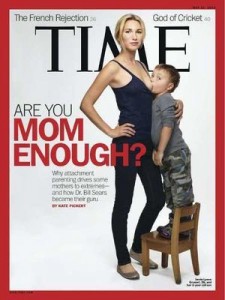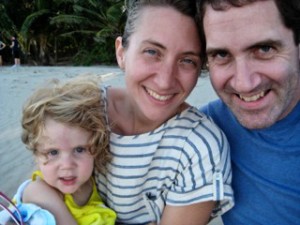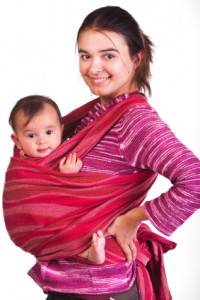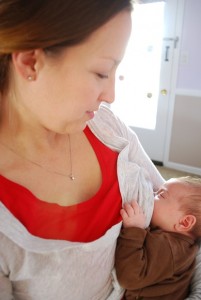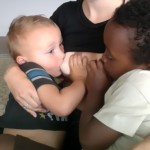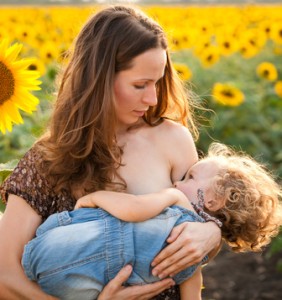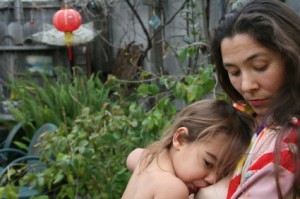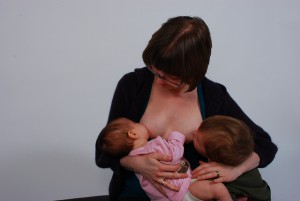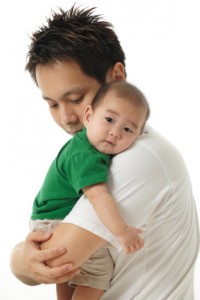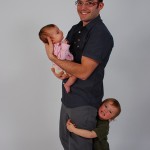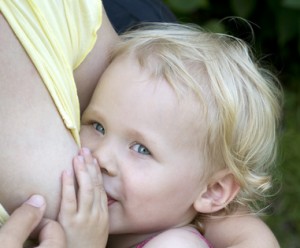For their May 21 cover story about Dr. Bill Sears and attachment parenting (AP), TIME Magazine took many photographs of four mothers and their children : Jamie Lynne Grumet of Los Angeles, Dionna Ford of Kansas City, Jessica Cary of Brooklyn, and Melinda Larson of Long Island. A photo of Jamie and her son was picked for the cover photo, and all of the moms were interviewed for an online article (though little of the material was actually used). The moms who were photographed asked KellyMom for a chance to bust some of the misconceptions about the TIME article. Since any of these moms could have ended up as the cover model, we’re thrilled to include all of them in our Q&A session.
The magazine article, the headline “Are You Mom Enough,” and the publicity surrounding the image of Jamie nursing her 3 year old son have sparked an international conversation about both breastfeeding and attachment parenting, with lots of negative press. I was disappointed to see so many people in the press and elsewhere defining AP as something quite different than how most of us see it. After incorrectly defining it, they go on to criticize a straw man version of attachment parenting that doesn’t even exist. For instance, I don’t know any attachment parent who feels you “must co-sleep and wear your baby in a sling from morn till night and breast-feed for years and never, ever let your baby cry.”
We asked readers of the KellyMom Facebook page what questions they would like to ask these moms. Following are their questions (many are amalgamations of several questions) and the responses from Jessica, Jamie, Melinda, and Dionna.
First of all, Jamie, what misconceptions about the TIME cover picture featuring you and your son would you like to correct?
Why did I (we) pick that shot for the cover?People assume I had creative control over the cover, which I did not. TIME chose the photo and the headline.
Was I paid? Not a penny.
Why did I let them pose me like that? I didn’t. I have no problem being in a standing position, but the image they captured does not represent the vision and direction of the shoot (which was to convey confidence and contentment). A lot of people don’t realize that many photographs are taken while moving around between positions. The picture TIME chose for the cover was one of these outtakes.
During the shoot we grabbed a stool and got the shot that is seen in Lightbox (the one that represents better what happened in that room). My son had fallen asleep nursing at my breast in that shot. (The shoot was short but it was his nap time when we got there). The shot is lovely and it was actually this or a very similar photo that was going to be the cover image. The shot TIME eventually chose was confirmed as the cover photo shortly before release.
I think the more nurturing shot still would have provoked the same uneducated and ignorant comments we have been hearing. However, a better tagline with a better picture (one that didn’t reinforce breastfeeding myths) might have been more embraced by the AP community.
1. How did TIME find and choose you?
Jessica ____________________
An employee of the photographer TIME hired is a nursing mom who attends a local breastfeeding support group run by one of my friends. This mom reached out to the group, looking for a breastfeeding mom/child (3-5 years old) for a TIME magazine article on “evolving parenthood.” My friend forwarded that email to a small group of moms with older nurslings and I was on that list. I sent in a few pictures the next morning. Six hours later (Friday afternoon) I heard from an Associate Photo Editor at TIME who said they were interested in us participating in the shoot that was going to happen on Sunday. We were in!
Jamie ____________________
TIME contacted me by email with their phone number asking if I would be interested in participating in a photo shoot for a story they were doing on attachment parenting. I then found out the story was going to be about Dr. Bill Sears. It sounded like a celebratory story because it was the 20th anniversary of his first book release. The author from TIME spoke about being immersed in the topic, and appeared to have a lot of respect for Dr. Sears.
Melinda ____________________
It really was a serendipitous type of a thing. A friend of a friend knew about the photo shoot in NY and thought that they would be interested in our family. I received a call from the photo editor on Friday and was at a photo shoot on Sunday.
Dionna ____________________
Time contacted me via email. TIME’s photo editor (Neil Harris) had emailed various bloggers in the attachment parenting/natural family living niche. The email specifically asked for families that were “big proponents of attachment parenting, had one toddler, and preferably had two or more children.” I called to refer several other bloggers I know who volunteer with NaturalParentsNetwork.com; but after Neil and I chatted for awhile, he asked me if my family would like to participate.
2. What were you hoping to achieve by being a part of this and do you feel that you were successful in achieving your goals?
Jessica ____________________
I thought – how cool that a national magazine wants to show/talk about breastfeeding an older child. I wrote at the time to a friend, that TIME “may vilify it in the article, but at least there’s a conversation happening in TIME for the masses to be exposed to the idea” of breastfeeding beyond infancy. I still think that’s true. If my goal was conversation, then yes, I think that has definitely been achieved!
Jamie ____________________
My hope was to be a catalyst for change in how we view breastfeeding. It seems that we have been moving at a snail’s pace towards normalizing breastfeeding and this article looked like an opportunity to share a positive message about AP and breastfeeding. We (meaning my husband and I) knew normalizing breastfeeding wouldn’t change overnight. However, we needed to take a stand and show there is no shame in parenting our children the way we know is best for our family.
I believe the cover alone did not achieve this goal. However, it has made the topic very public and I do believe the AP and breastfeeding communities have really stepped up to have difficult conversations with people about their misconceptions. It has been a community effort, and the brunt of the work has been undertaken by people who did not ask for it. I feel such a sense of community among mothers and fathers stepping up to say no to judgement among any healthy parenting style, and helping educate people about AP and breastfeeding.
Melinda ____________________
We were excited to be a part of a article that we were told was introducing Dr. Sears and Attachment Parenting to the world. The way that TIME wrote the article may not have been as positive as I was led to believe, but the message has been getting out. Amongst the mountain of criticism arose a very strong, confident steadfast response in the Attachment Parenting community, thanks to Jamie, Dr. Sears, API, Mayim and others. People are learning about it, paying attention and through that those who resonate with those philosophies can find support.
Dionna ____________________
I am passionate about normalizing breastfeeding – in public, past infancy, etc. I celebrate every woman who attempts to breastfeed, for three days or three years. I believe that one reason people in Western society are still so uncomfortable seeing women breastfeeding is because we do not see it enough. Our culture places much more emphasis on the sexual aspect of the breast, so much so that many people are uneasy seeing or discussing the primary, biological purpose of the breast – to nourish our children. By participating in this photo shoot, I hoped to be one more voice encouraging women, normalizing breastfeeding, sending out a message that nurturing your children in this way is normal, natural, and healthy. While I do not feel that the article had this message at all, I do think that there have been opportunities for education and conversation that would not have happened otherwise.
3. What messages about attachment parenting and/or breastfeeding were you hoping TIME would convey in their article?
Jessica ____________________
In my first conversation with TIME the photo editor explained that the article would be a profile of Dr. Sears and Attachment Parenting. My husband and I are attachment parenting, so I thought it was a perfect fit. From the little exposure I have to magazine/news coverage (I am a freelance writer), I went in without any expectations of what TIME would convey. I hoped it would be informative. I hoped it would paint AP as a back-to-basics type of childrearing. I hoped that it would be a counterpoint to the recent “tough love” / “it’s not neglect if you’re speaking french” parenting books that have hit the parenting scene of late. I hoped that their profile of Dr. Sears would be balanced. I hoped that they wouldn’t vilify breastfeeding older kids.
Before I got to read the article, I watched a video of the article’s author, Kate Pickert, online. From that two minute clip, I knew it wasn’t going to be a balanced piece. How she described AP was misinformed and the language she used was sensationalistic.
Jamie ____________________
My family was hoping this would be an outlet to show attachment parenting is a valid and normal parenting decision. There should be no shame in parenting your child this way.
Melinda ____________________
I was hoping that it would introduce attachment parenting, how it has grown and the community that it has created and leave it up to the individual to decide whether they wanted to support it or not.
Dionna ____________________
According to one survey, less than 10% of women nurse their children past 18 months. Because I write about breastfeeding past infancy on CodeNameMama.com, I get emails from women quite often who say “thank you for letting me know it is ok and that I’m not alone!” I had hoped that the author of the article would write about how natural and healthy ecological breastfeeding is for both mother and child. While the cover story did not convey that message, I was happy to see that one of the side stories did work (somewhat) to normalize nursing past infancy.
4. What kind of reaction to the article were you expecting? How has reality compared to what you thought you could expect?
Jessica ____________________
All of the attention was completely unexpected. I am just doing what has come naturally to me and my daughter. I breastfeed her. The fact that it was causing such an uproar was crazy. Or that a news van was parked outside our house all day until I came home with my little one (passed out in the stroller). It felt bizarre. I couldn’t believe that breastfeeding my daughter was this much news.
Jamie ____________________
My family was prepared for backlash if our photo made it into the article or onto the cover. We felt this way even when we had the hope that TIME would select a more nurturing photo. People in our society are uncomfortable with the idea that breasts are biologically designed to breastfeed offspring. This is even more true past the first year.
The reaction to the article has been lackluster. However, the reaction to the cover has definitely been polarizing. I believe the tagline was the main reason for this. The reaction to “Mom Enough” caused an uproar and was viewed as pitting moms against each other. TIME using this article to play into the mommy wars was not one of the potential risks my husband and I addressed prior to the shoot.
The reaction to me personally? I was expecting curiosity, but not as much personal attention as it seems we have ended up receiving. It was a risk we were willing to take in the hopes of doing something positive to normalize breastfeeding.
Melinda ____________________
I was expecting criticism, but proud to represent something that my husband and I truly believe in. For almost 7 years we have chosen to parent in a way that is different from our families’ and friends’ choices so we are used to the criticism. They way that the article was represented may have sparked a little more criticism than we imagined, but it is starting conversations about how we parent which will in turn eventually get the more positive message out there.
Dionna ____________________
We had no idea that the author was taking the particular slant she did with the article. In fact before agreeing to participate, I checked and double-checked with Neil Harris of TIME that attachment parenting and the families at the photo shoot would not be portrayed in a negative light. My husband and I never expected the reaction – but we would have never guessed that TIME was hoping to spin the feature as fuel for the “mommy wars.” I’m incredibly disappointed in TIME’s choice to cast AP in terms of being mom “enough.”
5. How do you feel about AP being portrayed as extreme? (TIME is not the only media outlet to do this)
Jessica ____________________
It’s unfortunate. And I also understand why it can look this way. Our culture focuses on independence of babies from the moment they exit the womb. AP, to me, honors the way parenting children has been done over time, around the world – which is to keep babies close, respond to them, breastfeed them when they’re hungry. This seems to go against every fiber of our American way of being which wants mom to regain her sense of identity right away, have the baby “get used to being on her own” at three weeks or sleep down the hall (and through the night) so mom and dad can have time to themselves as soon as possible.
Jamie ____________________
That always bothers me. There is nothing extreme about the way we parent. I find it relaxed and natural.
Melinda ____________________
Attachment Parenting, to some, does feel extreme because it is so selfless. Those who might label it that way could be afraid of it because it does take inner faith to trust your instincts rather than follow the crowd. No matter what you call it, those of us who have embraced attachment parenting did not do so because Dr. Sears told us to, we did it because our heart led us there. So no matter what label the media wants to give it, to us it is just parenting.
Dionna ____________________
Talking about attachment parenting as “extreme” is almost laughable for us. We think that most of what we do is easy.
Breastfeeding? Easy! (after we got through the initial struggles)
Cosleeping? Restful!
Having baby in a carrier? Convenient!
Treating my child gently and with respect? An investment in having a respectful child in the future!
The media loves to paint things as extreme – it’s what gets the headlines. Those of us who identify as AP parents are doing much more to educate people about the realities of what life can be like. We just need to take the opportunity TIME has given us and turn it into something positive.
6. What area(s) of AP have you struggled with and how were you able to resolve your issue(s)?
Jessica ____________________
I wish that I had realized that “balance” was as key to a happy, healthy family as was “responding with sensitivity”. I’m at home with my daughter. On the weekends, I love spending time with both her and my husband and when she was younger, I didn’t want to leave and have time for myself. But, then, come Monday, I was exhausted and frazzled and really felt the need for time alone. Now, I make sure to make time – for meditation, for yoga, for taking myself out to lunch.
When my daughter was a baby, it felt easy to respond to her with sensitivity. Now that she’s almost three, it can be challenging in the face of emotional upsets and tantrums. What’s helped us is to focus on prevention – don’t take her to the grocery store too close to nap time, etc. And it’s also been REALLY essential to me to have AP-minded folks in our life. My closest mommy friend (we met in our childbirth class) happens to practice AP and it’s been wonderful to have someone to support me, talk to, encourage, trade ideas, and challenge my old patterns along the way. I’ve also connected to our local API support group that has a vibrant yahoo group and monthly meetings.
Jamie ____________________
Dr. Sears talks about birth bonding, which I was not able to do. I had HELLP Syndrome with my pregnancy and my son was delivered 2 months premature. We were all so grateful he was born healthy at his gestational age. However, I was very sick (even after delivery) and I was not able to see him for three days. My husband, mom, dad, and sister-in-law (who is a pediatrician) took charge. My sister-in-law took a photo of my son in the NICU and brought it to me to help stimulate my milk. My husband would bring me the pump every two hours. If I was sleeping he took it upon himself to attach the pump for me so I could sleep through the pumping session. My parents and sister were my cheerleaders. They were so positive about being able to breastfeed and bond, but also were so great about understanding formula potentially could be an option, and there was no shame in using it if we needed it. We ended up not needing to use formula, but I think the encouragement from my family and knowing that no matter what, my son would be nourished, was what helped our breastfeeding story be successful.
Melinda ____________________
Attachment parenting is a constant growing and learning experience for everyone involved because it is a relationship. Being present and balancing has always been my struggle and as a parent continues to be. Through attachment parenting, though, I am more aware of its importance in my life and am continually challenged to find it.
Dionna ____________________
Gentle discipline is the hardest for me, because I was raised in a home where yelling and spanking were acceptable forms of discipline. Before I became a parent, I assumed that I would use similar discipline methods. But once I started reading about how respectful and gentle discipline can have much more positive long-term results, I decided that I wanted something different for my children. Changing this one area for me has not been easy – especially during my son’s preschool years! I continue to read and learn, and I try to surround myself by people who share the same values so that I can be motivated and challenged to continue on the path that feels right for our family.
7. Why do you think so many women think this article is calling them a bad mom?
Jessica ____________________
The title sets it up for sure. It draws moms in and has them already be on guard for what they’re about to read. I’m not sure that the article itself is making moms feel “bad” about their choices. I think it sets up AP moms to look crazy and clingy. Are moms really reading the article and saying “I want to be like this frazzled mom!” that the author opens the story with?
Jamie ____________________
I think that a lot of the “Mommy Wars” go back to the fact that almost every single parent wants the very best for their child. Children are such a gift and people really want to care for their children the best they can. When you choose a different way to parent some mothers become defensive and see it as a personal attack against their choices. No one wants to feel they did something detrimental to their child, so they are going to defend their choice. Also, there are some judgmental moms who do try to push their parenting styles on everyone. That isn’t right and creates a rift between parents, especially mothers.
I hope we can get to a point where we encourage all parents to make an educated healthy choice for their children. That does not mean all the choices will be the same. Families are different and children are different. There is not one-size-fits all in parenting.
Melinda ____________________
No one can call you a bad mom but yourself, but we all do it. Even I feel like a bad mom when I don’t reach the expectations I set for myself. No matter how the article was written or portrayed, some mothers will have pangs of regret for things they wish they did differently.
Dionna ____________________
It seems like mothers can get blamed for everything, doesn’t it? Baby not gaining weight fast enough? Must be your milk/method of feeding/something you ate. Preschooler acting out? You must not be spending enough time connecting with him/disciplining him/teaching him manners. Et cetera, et cetera. So of course when the title asks if you’re mom “enough,” the connotation is that you’re not if you’re not doing X, Y, and Z.
Do I believe that? No.
8. What advice do any of you have for moms who feel caught up in the “Mommy Wars”?
Jessica ____________________
To me, “Mommy Wars” is kind of like Valentine’s Day: a made-up “event” that guilts us into doing, buying, and believing in things we don’t need or want. We’ve got to understand that magazines and publishers want their stories and books to sell. That’s their job – to create controversy and excitement to increase interest in their product. They’re not out to support women in their role as mother. We’ve got to do that for each other. I know it sometimes feels hard to stop comparing ourselves to other moms. But, I think it starts there.
Jamie ____________________
Don’t take the bait. Find moms that are encouraging you to make the best choice for your family. That does not mean they will all be parenting the same way as you, but they will respect what you are doing. I personally have more friends that parent “conventionally” but they love and respect our family and choices.
Melinda ____________________
Follow your heart and find what works for you. Everyone should parent the way that they feel comfortable and confident. Take the philosophies that resonate with you and leave the rest:)
Dionna ____________________
It seems like much of the “mommy wars” come into play around values or practices that many of us feel passionately about. While I am an advocate for certain things, I try to remember to be compassionate – not judgmental.
It helps me to remember that no two families are alike. What works for one family is not going to work in the same way for another family. We’re all coming to this parenting gig with different resources, different experiences. The bottom line is, we all love our kids and are trying to do what’s best for them.
In a post I wrote about compassionate advocacy, I said:
“Please think before you speak online:
Will your message add value to the conversation?
Are your words meant to help, or hurt?
If your message were the only exposure someone had to your advocacy efforts, what would they take away?”
9. How did you feel about the way extended breastfeeding was portrayed on the cover of TIME?
Jessica ____________________
It didn’t portray breastfeeding the way it naturally occurs – in a nurturing, snuggly way. Though, I certainly have seen older kids standing up nursing while their moms are busy talking to me or others around her. As far as how it was publicly portrayed before – was it?!
One of the producers at ABC’s Nightline said to me during my interview, “I don’t think the uproar would have happened if the mom had been breastfeeding a six month old.” My response: “Maybe. But I can’t recall ever seeing a mom nursing a child of ANY age on the cover of a national magazine.” We see breasts on lots of other magazine covers, mainly to sell products. We never get to see breasts as what they are – mammary glands that nourish our babies.
Jamie ____________________
Awkward is the only term that really expresses that picture for me. I was there, so I know what they were going for (confidence and contentment), and it was not conveyed in that picture. I am not thrilled with the shot of me, but my biggest problem is with my son and his body language in the photo. I see his expression and arm placement as completely disconnected, which made the photo a poor representation of what breastfeeding really is past infancy (connectedness, comfort, and love…not to mention the antibodies and nutrients they are getting in the breast milk).
I have no problem nursing standing up (we have definitely done it at home…in fact, we did it today!) – I thought that standing would help show how infant breastfeeding is different than toddler breastfeeding (the majority of people seem not to understand that). What they were looking for is playfulness, confidence, contentment, and always nurturing in the pose. Do you see that in this photo? I don’t. They definitely have those shots and I feel they lost an opportunity to educate by choosing an outtake rather than one of the pictures we worked so hard to get.
Melinda ____________________
I personally would have chosen a different headline and picture to represent extended breastfeeding because of what it means to me, but no matter how loving you make it those who disagree will disagree.
Dionna ____________________
During the photo shoot, Martin Schoeller (the photographer for TIME) asked us to look confident, assured. The photos he had up as inspiration were all very maternal in appearance. I do feel that Jamie looked confident and assured in her picture, but the pose was not one that I felt anyone looked for during the entire shoot.
Regardless of the pose itself, I am glad that breastfeeding an older child was shown on the cover. Breastfeeding past infancy is normal, natural, and healthy, whether your child is three weeks old or three years old.
10. How would you respond to people who believe that your child(ren) will be negatively impacted by the current conversation or face bullying in the future related to their presence in the photos showing breastfeeding?
Jessica ____________________
I’m not sure why, but this question really pushes my buttons. I don’t see how my child would be negatively impacted by the conversation that’s happening. My child is growing up in a nurturing environment with parents that love her, feeding her according to her biological needs. And who’s going to be bullying my child? Her peers won’t even know about this debate unless their parents make it a big deal and encourage an atmosphere of intolerance. I think this question is a passive-aggressive way of putting down the mom – “I’m just worried about the children!” Really? As my child’s mother, do you believe I’m NOT worried about my child in every way?
Jamie ____________________
My mom was a breastfeeding advocate and there are pictures of me breastfeeding everywhere. People said the same thing to her, but she didn’t listen to them. I am proud of her for standing up for what she believes in. Her efforts were an attempt to help normalize breastfeeding for my generation.
As a mother, I’m here to teach my children right from wrong and help guide them into being strong, loved adults – not make life easy. Life is anything but easy, and a strong foundation of knowing who you are and what you believe in will make you life BETTER… Not easier.
I find it amazing how we have such a bullying problem in our country, yet we are empowering every current and future bully by making decisions based on potential future reactions.
Melinda ____________________
Children are negatively impacted and bullied every day, whether they graced the cover of TIME or not. Bullies are themselves in need of love and acceptance and I have no doubt that the children that these women are currently nurturing are caring and confident enough to recognize that and feel compassion for those who criticize.
Dionna ____________________
I am fortunate to be a member of a local community where it is very common for mothers to nurse into toddlerhood and beyond. I know many children who were breastfed until they were 4, 5, or 6 years old, and I know children who know children who nursed that long. We’ve had conversations since this cover came out, and for these children, this is no big deal. And that’s what we’re trying to do! We want to help make this no big deal for the children who are growing up today! Coincidentally, my sister is in Ecuador right now, and she’s had conversations about this with several of the people there. They are all very surprised – “all this over breastfeeding a three year old?” they’ve asked. I’d love that surprise to be shared by members of our culture in ten years.
In a different vein, kids make fun of other kids for so many different things: the clothes they wear, the neighborhood they live in, the religion their family practices. Would you move so that your child would not face taunts about the house you lived in? Would you expect someone to change religions so that their child could belong to the dominant cultural religion?
11. What would you say to a new mother to help normalize sustained breastfeeding for her and possibly help her envision that for herself and her family? How would your message change for a mother who is coming up on a year of breastfeeding?
Jessica ____________________
I would say to moms with kids of all ages – do what is working for you and your child. Don’t worry about breastfeeding a three year old. Take it day by day. I never planned to be nursing a three year old. My goal was two years. But, two years came and went and breastfeeding was a great way for my daughter and I to reconnect and handle all those big kid emotions (and mommy meltdowns) that start happening in the toddler years.
Jamie ____________________
Breastfeeding is normal and natural. Trust your instincts. If both mother and child are happy, then don’t listen to outsiders.
Melinda ____________________
I always encourage mothers to first of all surround themselves with other breastfeeding mothers even prior to giving birth. I myself was encouraged to attend La Leche League meetings by my birth education teacher and it was amazing. It really helps you set your expectations. When our expectations are compared to formula fed infants it can be overwhelming, when in reality it is much different. Breastfeeding in the beginning can be both easy and really hard. I remind new mothers that as the baby grows, the relationship evolves too, so don’t feel trapped by it but rather liberated by it. My message would be the same to mothers of toddlers: be around other mothers who breastfeed their toddlers, follow your heart, and remember it is a relationship.
Dionna ____________________
Nursing past infancy is part of a healthy, loving relationship. As my friend Lauren of Hobo Mama wrote: “You breastfeed day by day, not a year’s leap at a time. Nursing [my son] today, at 3-years-old, is different from breastfeeding him at 2-years-old by only one day, one moment. He didn’t become a gangly toddler overnight, so I had plenty of gradual time to adjust my vision of what a nursling looks like, each day.”
Just do what feels natural for you and your child.
12. How does your partner participate in attachment parenting your child(ren)?
Jessica ____________________
What started us off with a great foundation was that my husband was able to use all his vacation and sick days at once when our daughter was born. He was home with us for the first month of her life. This was an unbelievable help and not one we expected to have. He’d planned to take two weeks off, but O (our daughter) came a bit early and his schedule was already cleared, so it worked out. This set us both up to be caregiver to O. Feeding was my job. Nurturing me was his job. But so was cuddling, bouncing, diaper changing, and nighttime snuggles with our daughter. It gave us confidence that we could both respond to her needs. And seemed to give our daughter confidence to be soothed by both of us.
We talk about what we’re doing, what’s not working, and how we can respond to her needs and each others. We’re not perfect and we have our ugly moments, but we are learning. That’s the most important thing for me to remember – we are all learning. Not just our daughter, but we are too. We’re learning how to respect one another; how to talk to one another in kindness even we don’t feel very kind.
Jamie ____________________
My husband is just as close to our boys as I am. He participates in every part of parenting aside from breastfeeding, but he made up for that with a lot of cuddling. I did/do the breastfeeding and he does the roughhousing. Otherwise, our parenting styles are identical.
Some examples:
- Cooking with the kids
- Devotionals
- Taking the kids to the park/museums/aquariums etc.
- Play games
- When he is home from work he will participate as a teacher during homeschooling
- Bathing
- Dressing
- Cuddling
- Feeding
- Taking the kids to martial arts class
- Bedtime Stories
- Just loving them and being present
Above barely scrapes the surface of how my husband is an equal and happy participant in attachment parenting.
Melinda ____________________
My partner is my rock and my #1 support. I can’t do what I do without him. Our parenting style has really made us stronger as a couple and as parents.
Dionna ____________________
My husband is a wonderful partner. His role has changed through the years depending on my needs and the needs of our children. He’s done everything from all of the nighttime diaper changes, to doing the bulk of the housework when I feel overwhelmed and cannot help, to bouncing babies to sleep, to helping the preschooler navigate a changing world.
My partner is as much of an attachment parent as I am, it just looks a little different.
13. Do you believe that attachment parenting could cause America to take a step backward in the fight for women’s rights?
Jessica ____________________
I am a feminist. I have identified with that label since 8th grade (when I discovered Sassy magazine!). I don’t believe that attachment parenting and feminism are at odds with one another. I think our culture does not value the work of mothers. Only in a culture that values money, prestige and working outside the home as the source of female “empowerment” could motherhood be viewed as being anti-feminist. What’s anti-WOMAN are our country’s lack of financial support for new mothers (among a whole other host of things).
Jamie ____________________
Not at all. Quite the opposite. We need to work towards better leave for mothers and fathers when a child is introduced into the family. The United States can do much better than they are in encouraging both parents – helping uplift them during such a life changing event as a new child.
Melinda ____________________
Just because I choose to stay at home and raise my family does not mean I am giving up my rights. Just because more women are choosing to, does not mean that they are giving up their rights. We are working women! It is a choice that I hope will lose it’s stigma of being anti-feminist.
Dionna ____________________
I do not believe that mothers or fathers need to stay at home 24/7 to be attached parents. Working on building healthy attachments with our children can help any parent establish loving, secure relationships – regardless of whether they work inside or outside the home.
On a related note, I do wish our country had more generous maternity and paternity leave laws, and I hope that the science behind attachment parenting can provide the impetus to affect change.
14. What has been the best thing to come out of the TIME story about Dr. Sears? What has been the hardest thing?
Jessica ____________________
I’m having so many interesting conversations with people in all walks of my life – my 80 year old childless landlord, my friends, my family. Perfect strangers are chatting about it at the playground. That’s exciting to me!
Jamie ____________________
It really did get people talking. When have we ever had this big of a platform to talk about attachment parenting? My mom can’t even remember. The hardest thing is that the attention mostly has been negative from mainstream media, but that was expected regardless of the angle TIME took. I believe even with a better cover photo and loving tagline bringing mothers together it would have had a poor popular reaction. I am so moved by seeing how most people in the AP community have rallied together to start moving the conversation in the direction they want. Education is happening. People are going to come out of this more enlightened than before. Change isn’t going to happen overnight. I think at the end of the day the cover was one step backwards, but it opened the door for others to help take ten steps forward normalizing AP and breastfeeding.
Melinda ____________________
The best thing about the story is that people are talking about it and people who were looking have found support. The hardest thing is the controversial way we had to get there. Then again, no matter how you present the topic, it is controversial and making it extreme was a way to really get people talking about it.
Dionna ____________________
The TIME cover has started more conversations about AP and breastfeeding past infancy than there would have been without it. We don’t need TIME to tell our story – each of us has a voice, each of us can share how AP has worked for our families.
The hardest part when talking about the TIME story is getting past that title – I wish TIME would have just presented the AP philosophy without making it seem like a contest. It created divisiveness.
15. What advice would you share with a friend if they came to you and were considering becoming involved with a major media outlet for a story related to breastfeeding or attachment parenting?
Jessica ____________________
Know that you are not in control of how a story is spun. Show up, be yourself and talk about what is important. Don’t take the bait on provocative questions. And pray they edit it graciously.
Jamie ____________________
I would say beware. There is always risk assessment you have to do when having a major publication like this use your image (even if you feel everything is going in the direction you approve of). There are no guarantees; even when the risk that the final product will not look like what you envision is considerably low. Dr. Sears and our four families all took a risk and it didn’t work out the way we would have preferred. Just know that the outcome potentially may not be in your favor, but don’t let that stop you from making an educated decision to participate in something that will help a positive message come out.
Melinda ____________________
If it feels right, go for it. If I had anytime felt uncomfortable I would have declined. My family comes first.
Dionna ____________________
I’m not sure that any two experiences would be the same, but I would advise talking to the author/reporter about the tenor of the piece. My husband and I spent a lot of time talking about potential negative consequences – to our family, our child. We decided that the opportunity to normalize breastfeeding outweighed the potential negatives.
16. Do you think the TIME article/cover helped or hurt (or both) the effort to educate about AP?
Jessica ____________________
I think a national conversation about AP was a good thing. The coverage probably convinced the critics of their opinion and the AP community of their need to stick together. I think offering an alternative to the way of parenting that is so pervasive is important. I love our AP life – AND it can feel lonely at family gatherings or on the playground when talking about – or talking TO – our kids.
Jamie ____________________
I had a chance the day after the cover came out to speak to Dr. Sears about my concerns. He said that long-term he had no doubt this would be beneficial to AP. I respect him so much, so I took his positive message to heart. It was hard seeing all the negative reactions from this, but I do see the pendulum swinging the other way. This of course is due to the community I have grown to love so much standing up and giving truths about our lives. I think the cover was negative and complete shock factor journalism which got the world talking. The AP community took that dialogue and is turning it into something beautiful. I didn’t do that, my family was definitely taking a stand for something we believed in, but it was the efforts of my fellow APers that created the education currently going on in the world.
Melinda ____________________
I think it got the word out there, even though it might have been in a controversial way. It is now a household name and people are learning.
Dionna ____________________
Both, of course. But we are not TIME. We do not need to let TIME speak for us. We can choose to take the opportunity that TIME gave us – by putting AP and breastfeeding into the national spotlight – and turning it into a positive. Who would you listen to, the author of an article meant to sensationalize a parenting practice? Or a friend who lives it? Be the friend who normalizes it in your community.
____________________________
I would like to thank everyone – Jessica, Jamie, Melinda, and Dionna – for responding to our questions. The TIME article has raised both awareness and controversy, and it might be some time before the dust settles. We applaud your efforts to advocate for breastfeeding and attachment parenting, and are proud of you for taking the negative publicity and leveraging it into something positive.

